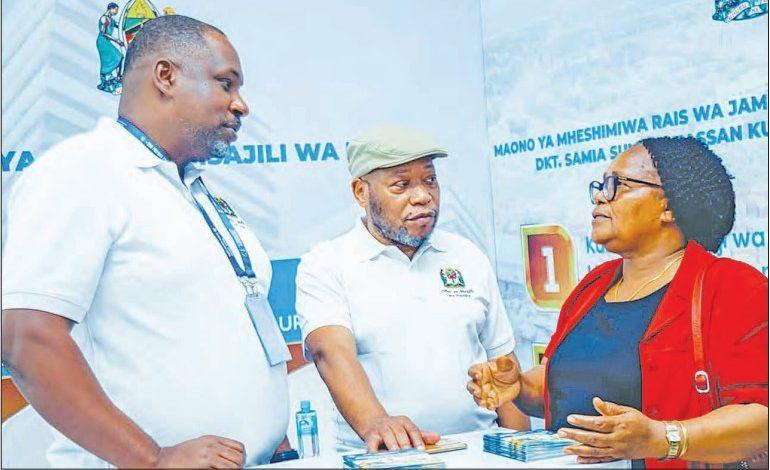Africa-Press – Tanzania. AS Tanzania continues its ambitious drive to reform State-owned Enterprises (SOEs), a broad spectrum of voices from senior government leaders to professional bodies and everyday citizens are converging in agreement: The reforms are working and their impact is beginning to reshape the public sector landscape.
This consensus was on full display at booth number 39 (Kilimanjaro Hall) of the Office of the Treasury Registrar (OTR) during the ongoing 49th Dar es Salaam International Trade Fair (DITF), known widely as Sabasaba.
The clearest expression of this support came from Mr Ridhiwani Kikwete, Minister of State in the Prime Minister’s Office (Labour, Youth, Employment and Persons with Disabilities), who visited the OTR booth on July 4. He praised the institution for spearheading reforms that have repositioned public enterprises toward performance and sustainability.
“We are grateful to the OTR under the strong leadership of Mr Nehemiah Mchechu for enabling public institutions to increase their efficiency,” he said.
Mr Kikwete linked these successes directly to the broader governance reforms championed by President Dr Samia Suluhu Hassan. “We are all witnesses. Under the Sixth Phase Government, we have seen significant operational changes in public institutions,” he added, framing these reforms as more than bureaucratic adjustments—they are part of a national development strategy.
This endorsement is not merely rhetorical. Several formerly underperforming SOEs have reversed years of financial decline. Institutions such as the Occupational Safety and Health Authority (OSHA), State Mining Corporation (STAMICO), Tanzania Electric Supply Company (TANESCO) and the Tanzania Petroleum Development Corporation (TPDC) are cited as prime examples of this turnaround.
OSHA, for instance, contributed 10.4bn/- to the Government Consolidated Fund during the 2024/25 fiscal year—a significant milestone for a regulatory agency that traditionally relied on government funding.
Building on this momentum, the Tanzania Ports Authority (TPA) stands out as a flagship case of operational and financial turnaround. Its contribution to the Consolidated Fund increased from 155.7bn/- in 2023/24 to 181bn/- in 2024/25, while simultaneously slashing operational expenditures by 505.59bn/-, representing a 46 per cent gain in efficiency.
According to Mr Sabato Kosuri, Head of Public Relations and Communication at the OTR, these outcomes reflect a broader transformation on how public institutions are being managed—shifting from dependency toward productivity, self-sustainability and fiscal discipline.
Mr Kosuri explained that this transformation is rooted in the enforcement of governance frameworks that demand accountability, results and value for money from public enterprises.
“Under the current reform agenda, institutions are expected to not only meet service delivery goals but also generate returns for the state. “What we are seeing now is that performance is no longer optional—it’s expected,” he asserted. Adding: “Every institution must justify its existence in terms of value creation and contribution to national development.” He further highlighted the role of leadership and strategic oversight in sustaining this momentum. While political leadership has been instrumental, professional oversight has been equally vital.
Prof Sylvia Temu, Chairperson of the National Board of Accountants and Auditors (NBAA), who visited the OTR booth on July 5, 2025, during the Sabasaba exhibition, praised the ongoing reforms for strengthening transparency, accountability and efficiency in public financial management.
“These reforms are not only necessary but timely, considering the growing demands for good governance and responsible use of public resources,” she said.
Prof Temu urged all stakeholders—including regulatory bodies, professional associations and public managers—to remain committed to reform implementation. “Looking ahead, all stakeholders must remain committed to sustaining the momentum of reform,” she emphasised. But it was not only officials and experts weighing in.
Mr Kazimoto Edward, an engaged citizen and visitor to the OTR booth on July 7, 2025, offered a perspective grounded in business logic.
“It’s impressive to see the Office presents such a clear role in overseeing public investments. For anyone interested in how government-owned businesses are managed, this was a valuable experience,” he said.
Viewing the reforms through an entrepreneurial lens, Mr Kazimoto called for the continued application of business principles in managing SOEs.
“Transparency and strategic oversight are essential. These institutions should operate with the efficiency of private sector firms,” he added, urging the OTR to deepen its governance frameworks and continue communicating its impact clearly to the public and potential investors.
What emerges from this confluence of voices is more than a reform success story—it is a shift in Tanzania’s governance culture. The transformation of SOEs from loss-making entities into financially viable contributors to national development is not accidental. It is the result of intentional policy direction, professional engagement and public oversight.
With leadership from the top, grounded implementation by oversight bodies like the OTR and NBAA and increasing public interest, Tanzania’s public sector reform is gaining both momentum and legitimacy.
Still, sustaining this trajectory will require more than goodwill. Institutional discipline, datadriven decision-making and transparency will remain nonnegotiables. But if the conversations at Sabasaba are any indication, the country may well be entering a new chapter in public sector governance—one where reform is not just a buzzword, but a measurable reality.
Prepared by Office of the Treasury Registrar
For More News And Analysis About Tanzania Follow Africa-Press







